Burt A. The Evolution of the British Empire and Commonwealth From the American Revolution
Подождите немного. Документ загружается.

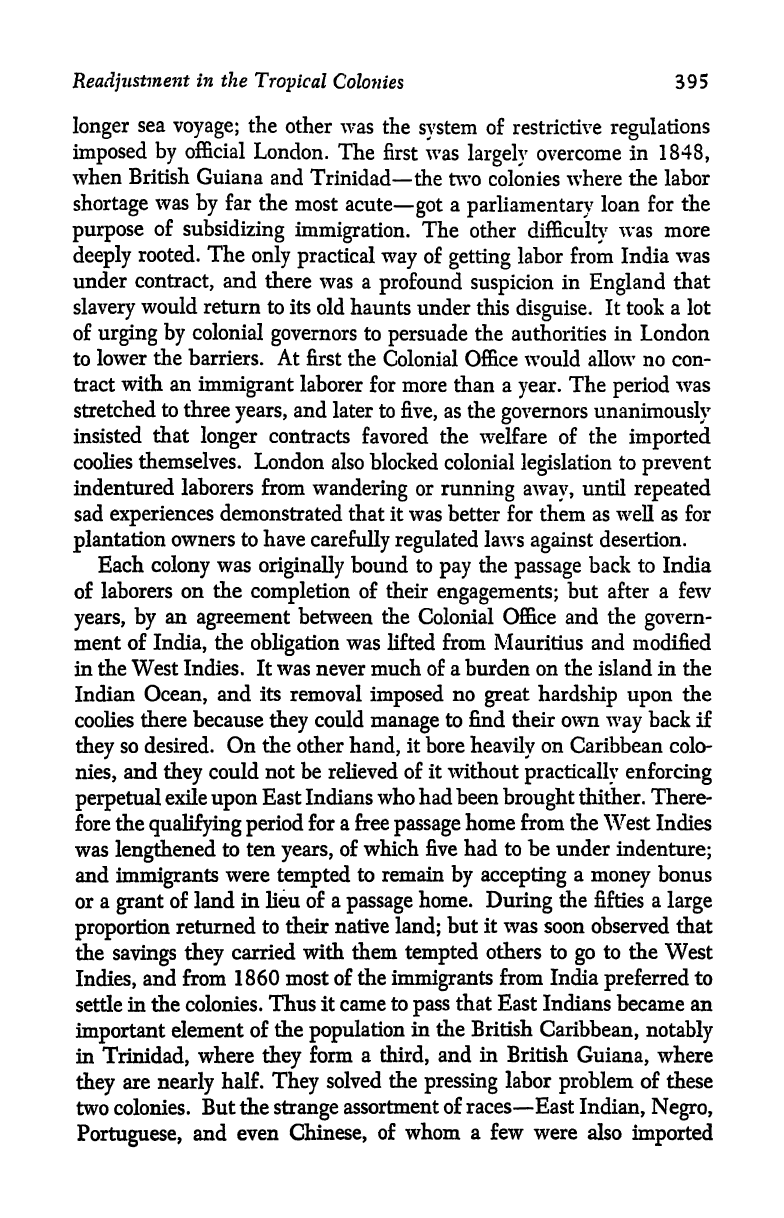
Readjustment
in
the
Tropical
Colonies
395
longer
sea
voyage;
the
other
was
the
system
of restrictive
regulations
imposed
by
official
London.
The
first
was
largely
overcome
in
1848,
when
British
Guiana
and
Trinidad
the
two
colonies
where
the labor
shortage
was
by
far
the
most
acute
got
a
parliamentary
loan for
the
purpose
of
subsidizing
immigration.
The
other
difficulty
was
more
deeply
rooted. The
only
practical
way
of
getting
labor
from India
was
under
contract,
and
there was
a
profound
suspicion
in
England
that
slavery
would return
to
its
old
haunts
under this
disguise.
It took
a
lot
of
urging
by
colonial
governors
to
persuade
the authorities
in London
to
lower
the
barriers.
At
first
the
Colonial Office
would
allow
no con-
tract
with an
immigrant
laborer
for
more than a
year.
The
period
was
stretched
to three
years,
and
later to
five,
as the
governors
unanimously
insisted
that
longer
contracts
favored
the
welfare of
the
imported
coolies
themselves.
London
also blocked
colonial
legislation
to
prevent
indentured
laborers from
wandering
or
running away,
until
repeated
sad
experiences
demonstrated that it
was better for
them
as well as for
plantation
owners
to
have
carefully
regulated
laws
against
desertion.
Each
colony
was
originally
bound to
pay
the
passage
back
to
India
of
laborers
on
the
completion
of
their
engagements;
but after
a
few
years,
by
an
agreement
between
the
Colonial Office
and the
govern-
ment
of
India,
the
obligation
was lifted
from
Mauritius and modified
in
the West
Indies. It
was
never much of a burden on the
island
in the
Indian
Ocean,
and
its
removal
imposed
no
great
hardship upon
the
coolies
there
because
they
could
manage
to
find
their
own
way
back
if
they
so desired.
On the other
hand,
it
bore
heavily
on
Caribbean colo-
nies,
and
they
could
not
be relieved of
it
without
practically
enforcing
perpetual
exile
upon
East Indians who
had been
brought
thither. There-
fore the
qualifying
period
for
a free
passage
home
from the West
Indies
was
lengthened
to
ten
years,
of
which five had to be under
indenture;
and
immigrants
were
tempted
to
remain
by
accepting
a
money
bonus
or
a
grant
of land
in lieu
of
a
passage
home.
During
the fifties
a
large
proportion
returned
to their
native
land;
but
it
was
soon
observed
that
the
savings
they
carried with
them
tempted
others to
go
to
the
West
Indies,
and
from
1860
most
of
the
immigrants
from
India
preferred
to
settle
in the
colonies.
Thus it
came
to
pass
that
East Indians
became an
important
element
of
the
population
in the British
Caribbean,
notably
in
Trinidad,
where
they
form
a
third,
and
in British
Guiana,
where
they
are
nearly
half.
They
solved
the
pressing
labor
problem
of
these
two
colonies.
But
the
strange
assortment
of
races
East
Indian,
Negro,
Portuguese,
and
even
Chinese,
of
whom
a
few were
also
imported
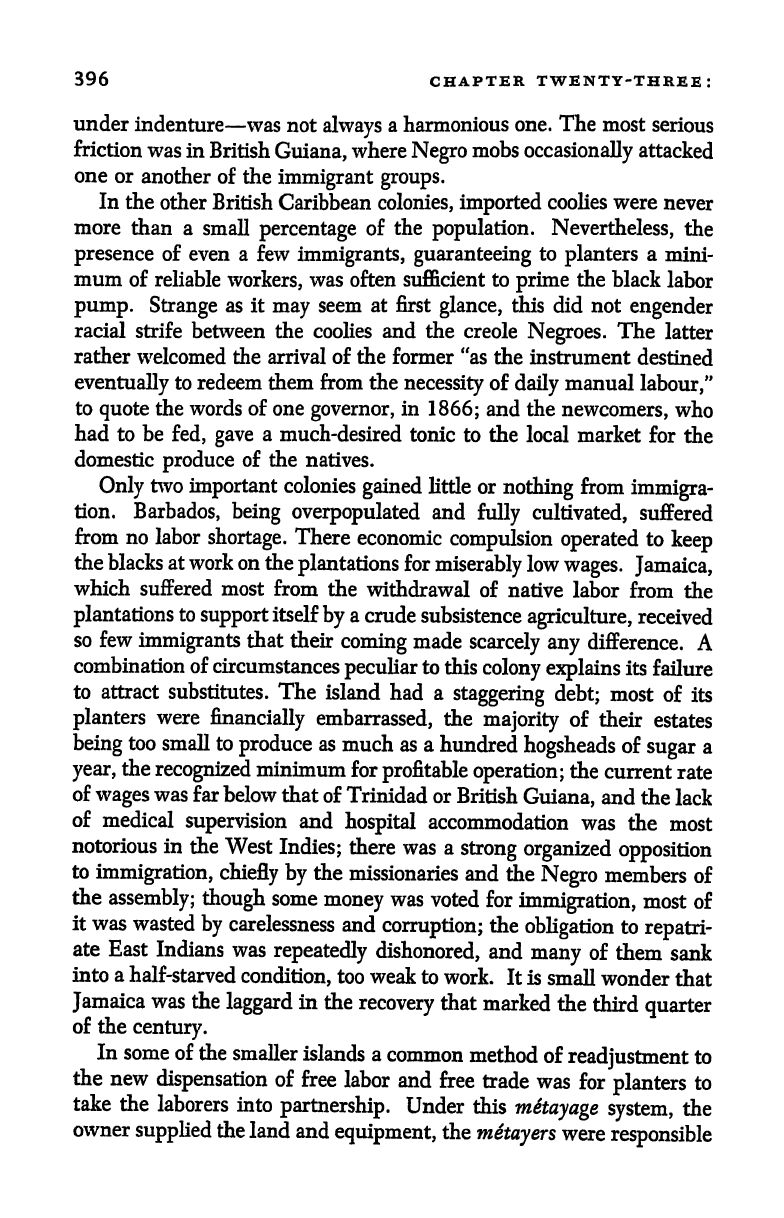
396
CHAPTER
TWENTY-THREE:
under
indenture
was not
always
a harmonious
one. The
most
serious
friction
was in
British
Guiana,
where
Negro
mobs
occasionally
attacked
one
or
another of
the
immigrant
groups.
In
the
other
British
Caribbean
colonies,
imported
coolies
were
never
more
than
a
small
percentage
of
the
population.
Nevertheless,
the
presence
of even a
few
immigrants, guaranteeing
to
planters
a
mini-
mum
of
reliable
workers,
was
often
sufficient to
prime
the
black
labor
pump.
Strange
as it
may
seem
at
first
glance,
this
did not
engender
racial
strife between the coolies and the
Creole
Negroes.
The
latter
rather
welcomed the arrival
of the
former
"as
the instrument
destined
eventually
to
redeem
them
from the
necessity
of
daily
manual
labour,"
to
quote
the words of one
governor,
in
1866;
and
the
newcomers,
who
had
to
be
fed,
gave
a
much-desired
tonic to the
local
market
for
the
domestic
produce
of the
natives.
Only
two
important
colonies
gained
little or
nothing
from
immigra-
tion.
Barbados,
being
overpopulated
and
fully
cultivated,
suffered
from no
labor
shortage.
There
economic
compulsion
operated
to
keep
the
blacks
at work on
the
plantations
for
miserably
low
wages.
Jamaica,
which suffered most
from
the
withdrawal
of
native
labor
from
the
plantations
to
support
itself
by
a
crude
subsistence
agriculture,
received
so few
immigrants
that their
coming
made
scarcely any
difference.
A
combination
of
circumstances
peculiar
to this
colony
explains
its
failure
to attract
substitutes.
The
island
had
a
staggering
debt;
most
of its
planters
were
financially
embarrassed,
the
majority
of
their
estates
being
too
small to
produce
as
much as a
hundred
hogsheads
of
sugar
a
year,
the
recognized
minimum
for
profitable
operation;
the
current
rate
of
wages
was far
below
that
of
Trinidad
or
British
Guiana,
and
the
lack
of
medical
supervision
and
hospital
accommodation
was
the
most
notorious
in
the West
Indies;
there
was
a
strong
organized
opposition
to
immigration,
chiefly by
the
missionaries
and die
Negro
members
of
the
assembly;
though
some
money
was
voted for
immigration,
most
of
it was
wasted
by
carelessness
and
corruption;
the
obligation
to
repatri-
ate East
Indians
was
repeatedly
dishonored,
and
many
of
them
sank
into
a
half-starved
condition,
too weak
to work.
It
is
small
wonder
that
Jamaica
was the
laggard
in
the
recovery
that
marked the
third
quarter
of the
century.
In some
of
the
smaller
islands
a
common
method of
readjustment
to
the new
dispensation
of
free
labor
and
free
trade
was
for
planters
to
take
the
laborers
into
partnership.
Under
this
metayage
system,
the
owner
supplied
the
land
and
equipment,
the
metayers
were
responsible
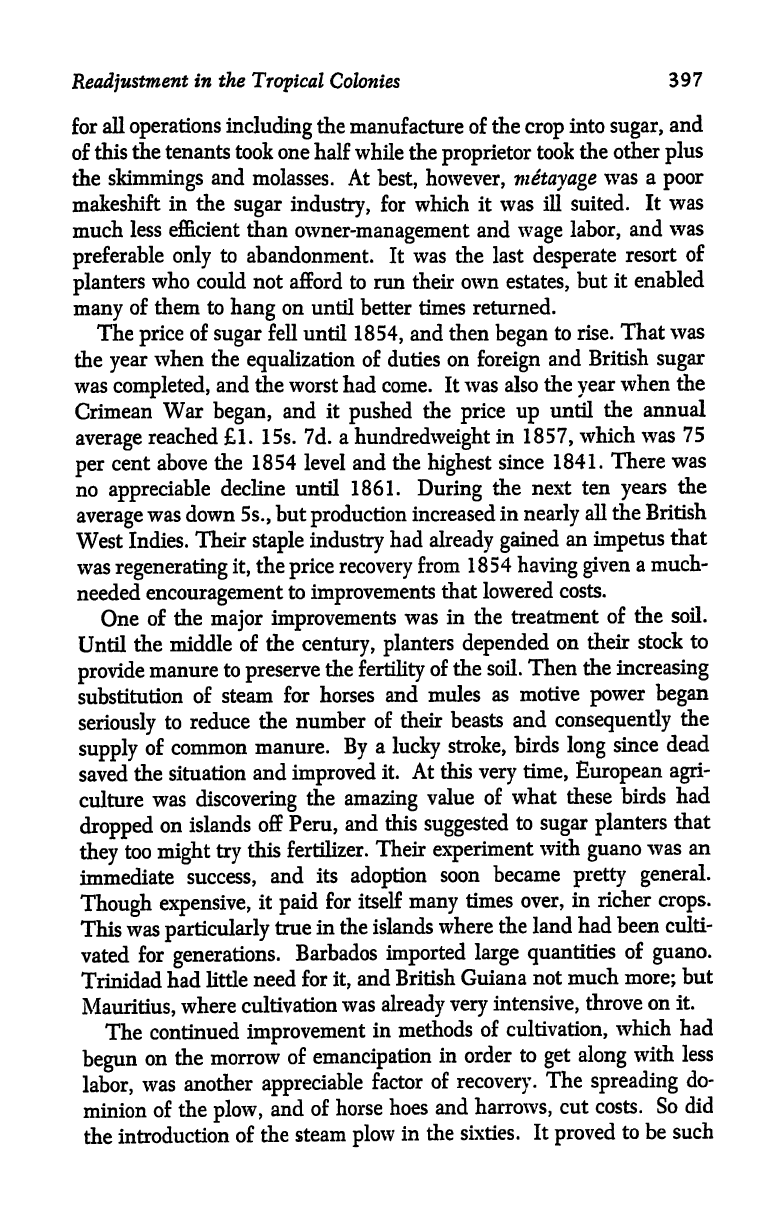
Readjustment
in the
Tropical
Colonies
397
for
all
operations
including
the
manufacture of the
crop
into
sugar,
and
of
this
the tenants
took one
half
while the
proprietor
took
the other
plus
the
skimmings
and
molasses.
At
best,
however,
metayage
was
a
poor
makeshift
in the
sugar
industry,
for which it
was ill
suited.
It
was
much
less
efficient
than
owner-management
and
wage
labor,
and
was
preferable
only
to
abandonment. It was
the
last
desperate
resort
of
planters
who could not
afford to run their
own
estates,
but
it
enabled
many
of
them
to
hang
on
until better times
returned.
The
price
of
sugar
fell
until
1854,
and
then
began
to
rise.
That
was
the
year
when
the
equalization
of
duties on
foreign
and
British
sugar
was
completed,
and the
worst had come.
It was
also
the
year
when
the
Crimean
War
began,
and it
pushed
the
price up
until
the
annual
average
reached 1. 15s. 7d. a
hundredweight
in
1857,
which
was
75
per
cent
above
the 1854
level and
the
highest
since
1841.
There
was
no
appreciable
decline until
1861.
During
the
next
ten
years
the
average
was down
5s.,
but
production
increased
in
nearly
all
the
British
West
Indies.
Their
staple industry
had
already
gained
an
impetus
that
was
regenerating
it,
the
price
recovery
from
1854
having given
a
much-
needed
encouragement
to
improvements
that lowered
costs.
One
of the
major
improvements
was
in the
treatment
of
the soil.
Until
the
middle
of
the
century,
planters
depended
on
their
stock
to
provide
manure
to
preserve
the
fertility
of
the
soil. Then
the
increasing
substitution
of
steam
for horses
and
mules
as
motive
power
began
seriously
to reduce
the
number
of
their beasts
and
consequently
the
supply
of
common
manure.
By
a
lucky
stroke,
birds
long
since
dead
saved
the
situation
and
improved
it.
At this
very
time,
European
agri-
culture
was
discovering
the
amazing
value of
what
these birds
had
dropped
on
islands
off
Peru,
and
this
suggested
to
sugar
planters
that
they
too
might
try
this fertilizer.
Their
experiment
with
guano
was an
immediate
success,
and
its
adoption
soon
became
pretty
general.
Though
expensive,
it
paid
for
itself
many
times
over,
in richer
crops.
This
was
particularly
true
in the
islands
where
the land
had
been
culti-
vated
for
generations.
Barbados
imported
large
quantities
of
guano.
Trinidad
had
little
need
for
it,
and
British
Guiana
not
much
more;
but
Mauritius,
where
cultivation
was
already
very
intensive,
throve
on
it.
The
continued
improvement
in methods
of
cultivation,
which had
begun
on
the
morrow
of
emancipation
in
order
to
get
along
with
less
labor,
was
another
appreciable
factor
of
recovery.
The
spreading
do-
minion
of
the
plow,
and
of
horse
hoes
and
harrows,
cut
costs.
So
did
the
introduction
of the
steam
plow
in
the
sixties.
It
proved
to
be
such
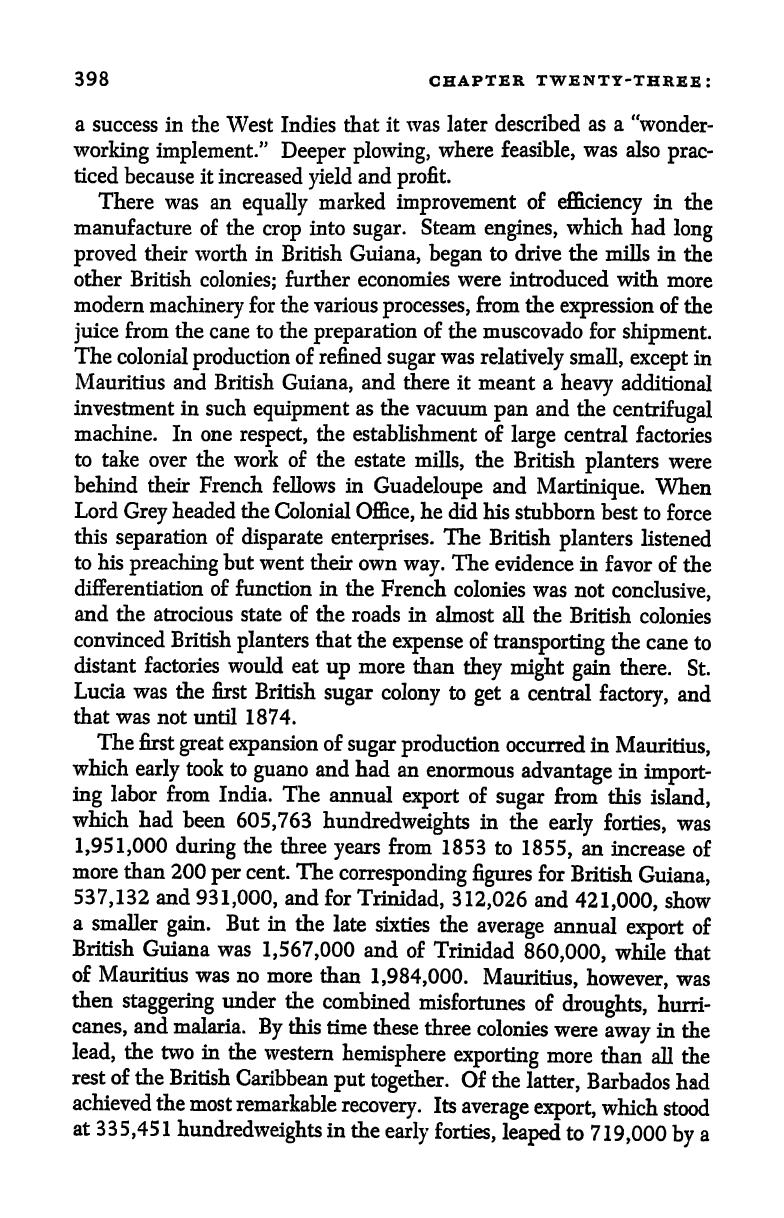
398
CHAPTER
TWENTY-THREE:
a
success
in the West Indies that
it
was later
described as
a
"wonder-
working
implement."
Deeper
plowing,
where
feasible,
was
also
prac-
ticed
because it
increased
yield
and
profit.
There
was an
equally
marked
improvement
of
efficiency
in
the
manufacture of the
crop
into
sugar.
Steam
engines,
which
had
long
proved
their worth in British
Guiana,
began
to drive
the
mills in
the
other
British
colonies;
further
economies
were
introduced with
more
modern
machinery
for the various
processes,
from the
expression
of
the
juice
from the cane to the
preparation
of
the muscovado
for
shipment.
The
colonial
production
of
refined
sugar
was
relatively
small,
except
in
Mauritius and
British
Guiana,
and there it
meant
a
heavy
additional
investment
in such
equipment
as
the
vacuum
pan
and
the
centrifugal
machine. In one
respect,
the
establishment of
large
central
factories
to take
over the work of the
estate
mills,
the British
planters
were
behind their French fellows in
Guadeloupe
and
Martinique.
When
Lord
Grey
headed
the
Colonial
Office,
he
did
his
stubborn
best
to
force
this
separation
of
disparate
enterprises.
The
British
planters
listened
to
his
preaching
but
went their
own
way.
The
evidence in
favor
of
the
differentiation
of
function in
the
French
colonies
was
not
conclusive,
and the
atrocious
state
of the
roads
in
almost
all the
British
colonies
convinced British
planters
that
the
expense
of
transporting
the
cane
to
distant factories
would eat
up
more
than
they
might
gain
there.
St.
Lucia
was the first
British
sugar colony
to
get
a
central
factory,
and
that was
not
until 1874.
The
first
great
expansion
of
sugar
production
occurred in
Mauritius,
which
early
took
to
guano
and
had an
enormous
advantage
in
import-
ing
labor from India.
The
annual
export
of
sugar
from
this
island,
which had
been
605,763
hundredweights
in
the
early
forties,
was
1,951,000
during
the
three
years
from 1853
to
1855,
an
increase
of
more
than 200
per
cent.
The
corresponding figures
for
British
Guiana,
537,132
and
931,000,
and for
Trinidad,
312,026
and
421,000,
show
a
smaller
gain.
But
in the
late
sixties
the
average
annual
export
of
British Guiana
was
1,567,000
and of
Trinidad
860,000,
while that
of
Mauritius
was no
more
than
1,984,000.
Mauritius,
however,
was
then
staggering
under
the
combined
misfortunes
of
droughts,
hurri-
canes,
and
malaria.
By
this
time
these
three
colonies
were
away
in
the
lead,
the
two in
the
western
hemisphere
exporting
more
than
all
the
rest
of
the
British
Caribbean
put
together.
Of
the
latter,
Barbados had
achieved the
most
remarkable
recovery.
Its
average
export,
which
stood
at
335,451
hundredweights
in
the
early
forties,
leaped
to
719,000
by
a
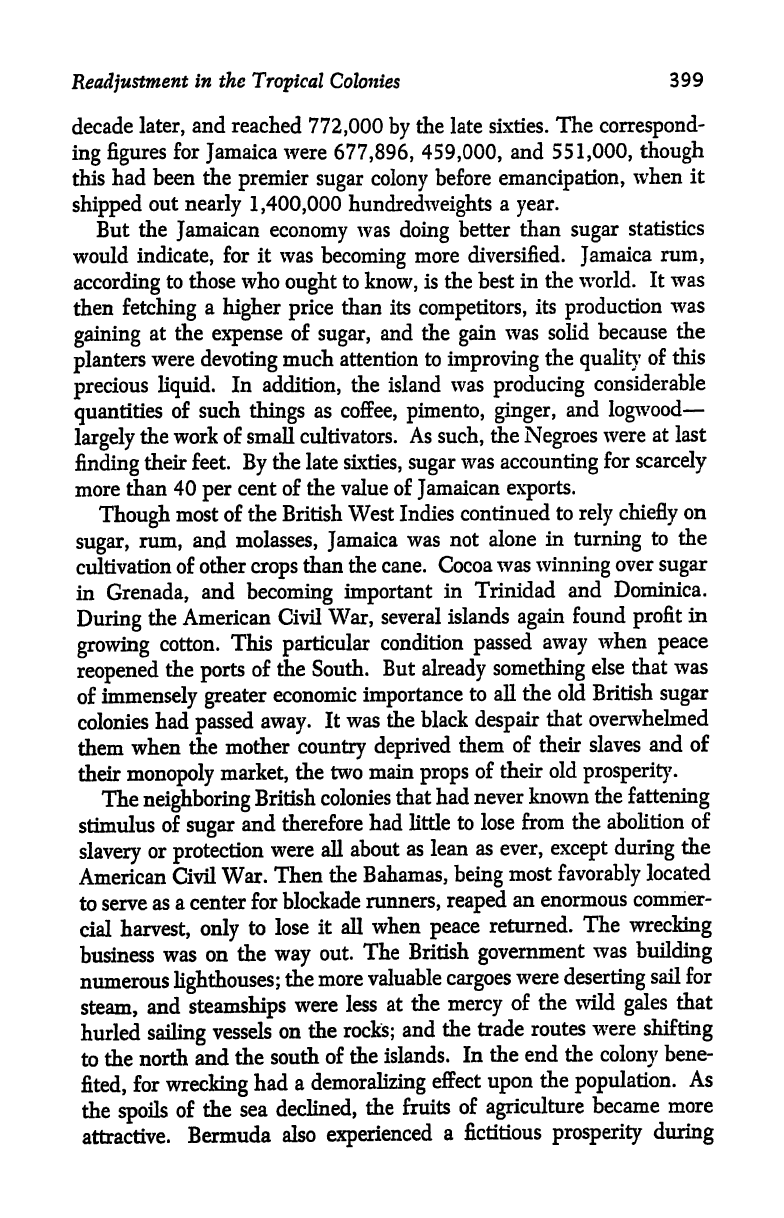
Readjustment
in the
Tropical
Colonies
399
decade
later,
and
reached
772,000
by
the
late
sixties.
The
correspond-
ing
figures
for
Jamaica
were
677,896,
459,000,
and
551,000,
though
this
had
been the
premier
sugar
colony
before
emancipation,
when
it
shipped
out
nearly
1,400,000
hundredweights
a
year.
But
the
Jamaican
economy
was
doing
better
than
sugar
statistics
would
indicate,
for
it
was
becoming
more
diversified.
Jamaica
rum,
according
to those who
ought
to
know,
is
the
best
in
the
world.
It
was
then
fetching
a
higher
price
than its
competitors,
its
production
was
gaining
at
the
expense
of
sugar,
and
the
gain
was
solid
because
the
planters
were
devoting
much attention to
improving
the
quality
of
this
precious
liquid.
In
addition,
the
island
was
producing
considerable
quantities
of such
things
as
coffee,
pimento, ginger,
and
logwood
largely
the work of
small cultivators.
As
such,
the
Negroes
were
at
last
finding
their
feet.
By
the late
sixties,
sugar
was
accounting
for
scarcely
more
than 40
per
cent
of
the
value of
Jamaican
exports.
Though
most of
the British
West Indies
continued
to
rely
chiefly
on
sugar,
rum,
and
molasses,
Jamaica
was
not
alone
in
turning
to
the
cultivation
of
other
crops
than
the cane.
Cocoa
was
winning
over
sugar
in
Grenada,
and
becoming
important
in
Trinidad
and
Dominica.
During
the
American
Civil
War,
several
islands
again
found
profit
in
growing
cotton.
This
particular
condition
passed
away
when
peace
reopened
the
ports
of
the
South.
But
already
something
else
that
was
of
immensely greater
economic
importance
to all
the old
British
sugar
colonies
had
passed
away.
It
was
the
black
despair
that overwhelmed
them
when
the
mother
country
deprived
them
of their
slaves
and
of
their
monopoly
market,
the
two
main
props
of
their
old
prosperity.
The
neighboring
British
colonies
that
had
never
known
the
fattening
stimulus
of
sugar
and
therefore
had
little
to
lose
from
the
abolition
of
slavery
or
protection
were
all
about
as
lean
as
ever,
except
during
the
American
Civil
War.
Then
the
Bahamas,
being
most
favorably
located
to
serve
as
a center
for
blockade
runners,
reaped
an enormous
commer-
cial
harvest,
only
to
lose
it
all
when
peace
returned.
The
wrecking
business
was
on
the
way
out.
The
British
government
was
building
numerous
lighthouses;
the
more
valuable
cargoes
were
deserting
sail for
steam,
and
steamships
were
less
at
the
mercy
of
the
wild
gales
that
hurled
sailing
vessels
on
the
rocks;
and
the
trade
routes
were
shifting
to
the
north
and
the
south
of the
islands.
In
the end
the
colony
bene-
fited,
for
wrecking
had
a
demoralizing
effect
upon
the
population.
As
the
spoils
of
the sea
declined,
the fruits
of
agriculture
became
more
attractive.
Bermuda
also
experienced
a
fictitious
prosperity during
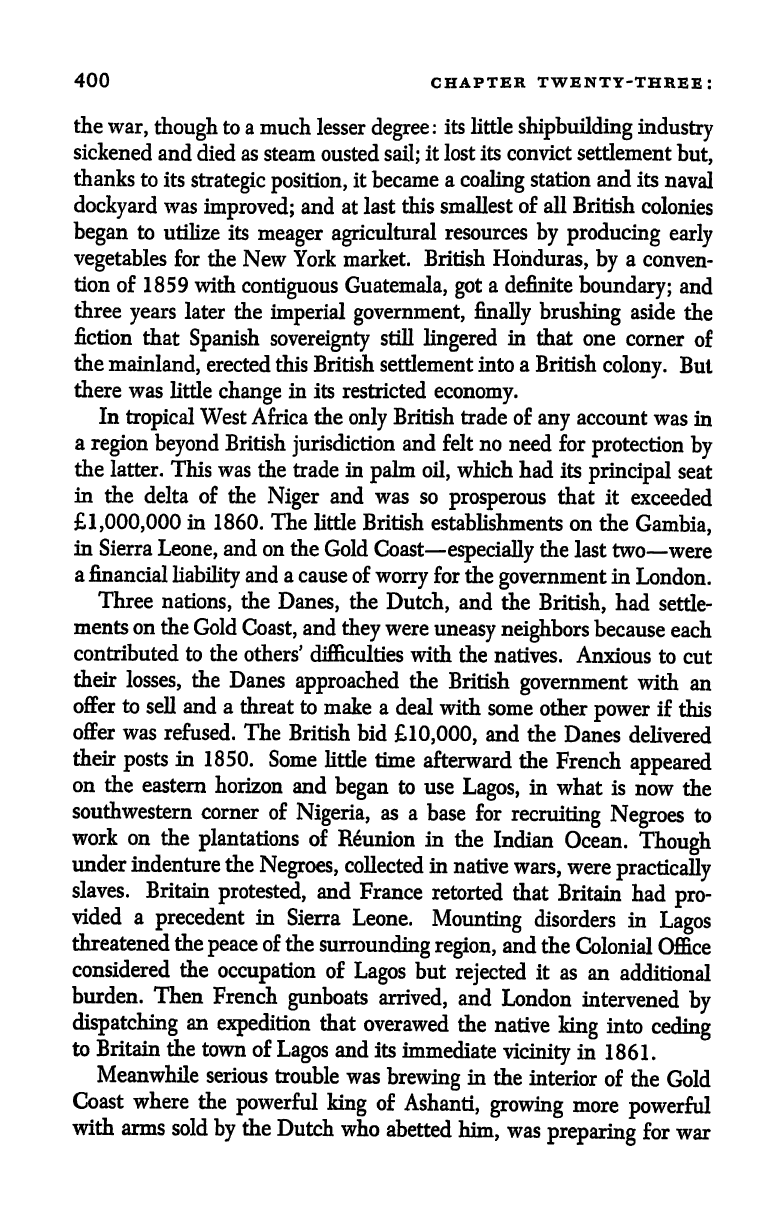
400
CHAPTER
TWENTY-THREE:
the
war,
though
to
a
much
lesser
degree:
its little
shipbuilding
industry
sickened
and died
as
steam
ousted
sail;
it lost
its
convict settlement
but,
thanks
to
its
strategic position,
it
became
a
coaling
station and
its
naval
dockyard
was
improved;
and
at
last
this
smallest
of all British
colonies
began
to
utilize
its
meager agricultural
resources
by
producing
early
vegetables
for
the New York market.
British
Honduras,
by
a
conven-
tion
of
1859 with
contiguous
Guatemala,
got
a definite
boundary;
and
three
years
later the
imperial government,
finally
brushing
aside
the
fiction
that
Spanish
sovereignty
still
lingered
in that
one
corner
of
the
mainland,
erected
this British
settlement
into
a
British
colony.
Bui
there
was little
change
in its restricted
economy.
In
tropical
West Africa the
only
British trade
of
any
account
was
in
a
region beyond
British
jurisdiction
and felt
no
need
for
protection
by
the
latter.
This was
the trade in
palm
oil,
which
had
its
principal
seat
in
the
delta of the
Niger
and was
so
prosperous
that
it
exceeded
1,000,000
in 1860.
The
little
British
establishments on
the
Gambia,
in Sierra
Leone,
and on
the Gold
Coast
especially
the last
two
were
a
financial
liability
and
a
cause of
worry
for the
government
in
London.
Three
nations,
the
Danes,
the
Dutch,
and
the
British,
had
settle-
ments on
the
Gold
Coast,
and
they
were
uneasy
neighbors
because
each
contributed
to
the
others'
difficulties with
the
natives.
Anxious
to
cut
their
losses,
the
Danes
approached
the
British
government
with
an
offer
to sell
and
a
threat
to
make a
deal with
some
other
power
if
this
offer
was
refused. The
British
bid
10,000,
and
the
Danes
delivered
their
posts
in
1850.
Some
little
time
afterward
the
French
appeared
on
the
eastern
horizon and
began
to use
Lagos,
in
what is
now
the
southwestern
corner
of
Nigeria,
as a
base for
recruiting
Negroes
to
work
on the
plantations
of
Reunion in the
Indian
Ocean.
Though
under
indenture the
Negroes,
collected in
native
wars,
were
practically
slaves.
Britain
protested,
and
France
retorted
that
Britain
had
pro-
vided
a
precedent
in
Sierra
Leone.
Mounting
disorders
in
Lagos
threatened the
peace
of the
surrounding
region,
and
the
Colonial
Office
considered
the
occupation
of
Lagos
but
rejected
it
as
an
additional
burden.
Then
French
gunboats
arrived,
and
London
intervened
by
dispatching
an
expedition
that
overawed
the
native
king
into
ceding
to
Britain
the
town
of
Lagos
and
its
immediate
vicinity
in
1861.
Meanwhile
serious
trouble
was
brewing
in
the
interior
of
the
Gold
Coast
where
the
powerful
king
of
Ashanti,
growing
more
powerful
with
arms
sold
by
the
Dutch
who
abetted
him,
was
preparing
for
war
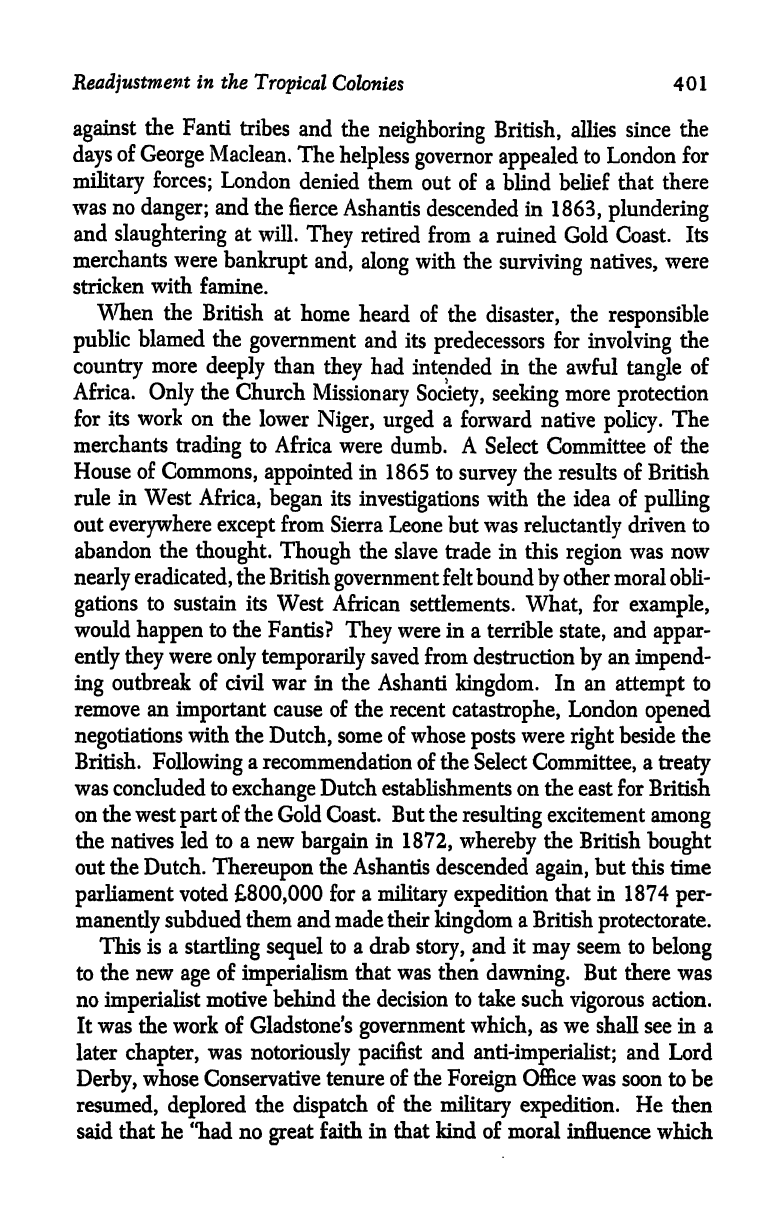
Readjustment
in
the
Tropical
Colonies
401
against
the Fanti
tribes
and
the
neighboring
British,
allies
since
the
days
of
George
Maclean.
The
helpless
governor
appealed
to
London
for
military
forces;
London
denied
them
out of a
blind belief
that
there
was
no
danger;
and
the
fierce
Ashantis
descended
in
1863,
plundering
and
slaughtering
at
will.
They
retired from
a
ruined
Gold Coast.
Its
merchants
were
bankrupt
and,
along
with the
surviving
natives,
were
stricken
with
famine.
When the
British
at
home
heard
of
the
disaster,
the
responsible
public
blamed the
government
and
its
predecessors
for
involving
the
country
more
deeply
than
they
had intended
in
the
awful
tangle
of
Africa.
Only
the
Church
Missionary Society,
seeking
more
protection
for
its
work
on
the
lower
Niger,
urged
a
forward
native
policy.
The
merchants
trading
to
Africa
were
dumb.
A
Select
Committee
of the
House of
Commons,
appointed
in
1865
to
survey
the
results of British
rule
in
West
Africa,
began
its
investigations
with the idea of
pulling
out
everywhere
except
from
Sierra
Leone but was
reluctantly
driven
to
abandon
the
thought.
Though
the
slave
trade
in this
region
was
now
nearly
eradicated,
the
British
government
felt
bound
by
other moral
obli-
gations
to sustain its
West
African settlements.
What,
for
example,
would
happen
to
the
Fantis?
They
were in a
terrible
state,
and
appar-
ently
they
were
only
temporarily
saved from
destruction
by
an
impend-
ing
outbreak
of civil
war
in the
Ashanti
kingdom.
In
an
attempt
to
remove an
important
cause
of the recent
catastrophe,
London
opened
negotiations
with
the
Dutch,
some
of
whose
posts
were
right
beside
the
British.
Following
a
recommendation of
the
Select
Committee,
a
treaty
was
concluded
to
exchange
Dutch
establishments on the east
for British
on
the west
part
of
the
Gold
Coast.
But the
resulting
excitement
among
the natives led to
a
new
bargain
in
1872,
whereby
the British
bought
out
the Dutch.
Thereupon
the
Ashantis
descended
again,
but
this time
parliament
voted
800,000
for
a
military
expedition
that
in
1874
per-
manently
subdued
them
and made
their
kingdom
a
British
protectorate.
This is
a
startling
sequel
to a drab
story,
and
it
may
seem to
belong
to the
new
age
of
imperialism
that was then
dawning.
But there
was
no
imperialist
motive behind
the decision to take such
vigorous
action.
It was
the work of Gladstone's
government
which,
as
we shall
see in a
later
chapter,
was
notoriously
pacifist
and
anti-imperialist;
and
Lord
Derby,
whose
Conservative
tenure
of the
Foreign
Office was
soon
to be
resumed,
deplored
the
dispatch
of
the
military
expedition.
He
then
said
that
he "had no
great
faith
in
that
kind
of moral
influence
which
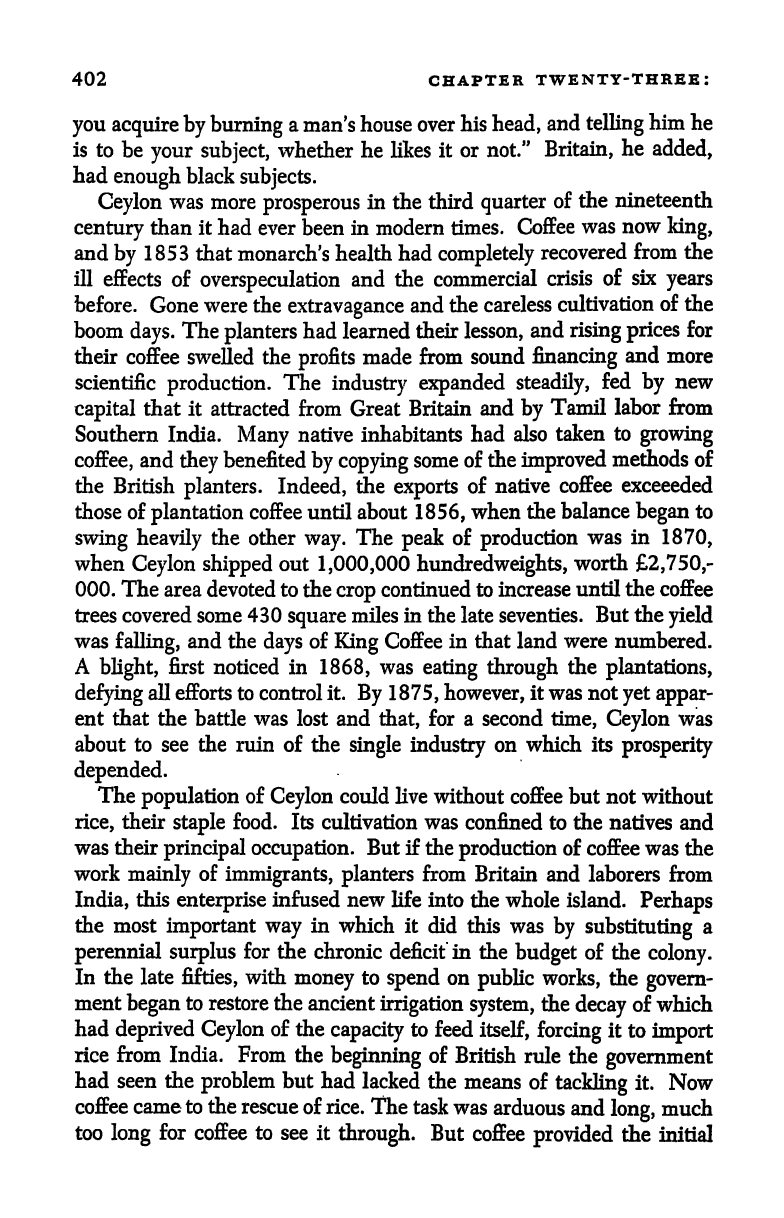
402
CHAPTER
TWENTY-THREE:
you
acquire
by
burning
a
man's house
over
his
head,
and
telling
him
he
is
to be
your
subject,
whether
he
likes
it
or not."
Britain,
he
added,
had
enough
black
subjects.
Ceylon
was
more
prosperous
in the
third
quarter
of
the nineteenth
century
than it
had ever
been
in
modern times.
Coffee
was
now
king,
and
by
1853
that
monarch's health
had
completely
recovered
from
the
ill
effects
of
overspeculation
and
the commercial
crisis
of
six
years
before.
Gone were
the
extravagance
and
the
careless
cultivation
of
the
boom
days.
The
planters
had
learned
their
lesson,
and
rising prices
for
their
coffee
swelled
the
profits
made from
sound
financing
and more
scientific
production.
The
industry expanded
steadily,
fed
by
new
capital
that
it attracted
from Great
Britain
and
by
Tamil
labor from
Southern
India.
Many
native inhabitants
had also
taken
to
growing
coffee,
and
they
benefited
by
copying
some
of
the
improved
methods
of
the
British
planters.
Indeed,
the
exports
of
native
coffee exceeeded
those of
plantation
coffee
until about
1856,
when the
balance
began
to
swing
heavily
the other
way.
The
peak
of
production
was
in
1870,
when
Ceylon
shipped
out
1,000,000
hundredweights,
worth
2,750,-
000. The area
devoted to
the
crop
continued
to
increase
until
the
coffee
trees
covered
some 430
square
miles in the late seventies.
But
the
yield
was
falling,
and the
days
of
King
Coffee
in that
land
were
numbered.
A
blight,
first
noticed in
1868,
was
eating
through
the
plantations,
defying
all efforts to control it.
By
1
875, however,
it was not
yet appar-
ent that the
battle was lost and
that,
for
a
second
time,
Ceylon
was
about to see
the
ruin of
the
single
industry
on
which
its
prosperity
depended.
The
population
of
Ceylon
could
live
without
coffee but
not without
rice,
their
staple
food. Its cultivation
was
confined to the natives
and
was
their
principal occupation.
But if
the
production
of coffee
was the
work
mainly
of
immigrants, planters
from
Britain and laborers
from
India,
this
enterprise
infused
new
life into
the
whole
island.
Perhaps
the
most
important
way
in
which it
did this was
by
substituting
a
perennial
surplus
for the
chronic deficit
in
the
budget
of the
colony.
In the late
fifties,
with
money
to
spend
on
public
works,
the
govern-
ment
began
to restore the
ancient
irrigation system,
the
decay
of which
had
deprived Ceylon
of
the
capacity
to
feed
itself,
forcing
it to
import
rice
from India. From
the
beginning
of
British
rule
the
government
had
seen
the
problem
but
had
lacked
the
means
of
tackling
it.
Now
coffee
came to
the
rescue of rice. The
task
was
arduous
and
long,
much
too
long
for
coffee
to
see it
through.
But
coffee
provided
the
initial
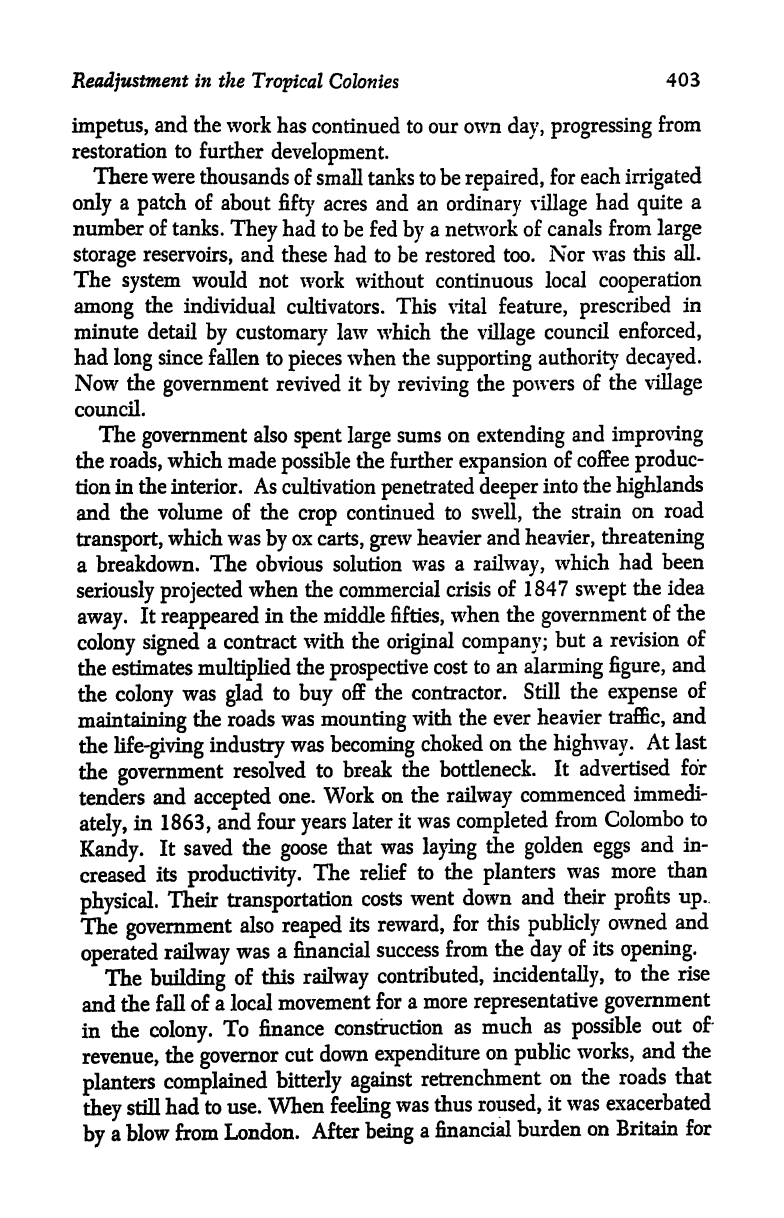
Readjustment
in
the
Tropical
Colonies
403
impetus,
and the
work
has
continued
to our own
day,
progressing
from
restoration
to
further
development.
There were
thousands
of
small tanks to
be
repaired,
for
each
irrigated
only
a
patch
of
about
fifty
acres
and
an
ordinary village
had
quite
a
number of
tanks.
They
had to
be fed
by
a network of
canals
from
large
storage
reservoirs,
and
these
had
to
be
restored
too.
Nor
was
this
all.
The
system
would not
work without continuous
local
cooperation
among
the
individual
cultivators. This
vital
feature,
prescribed
in
minute detail
by
customary
law which
the
village
council
enforced,
had
long
since
fallen
to
pieces
when the
supporting
authority
decayed.
Now
the
government
revived
it
by reviving
the
powers
of
the
village
council.
The
government
also
spent large
sums on
extending
and
improving
the
roads,
which
made
possible
the further
expansion
of
coffee
produc-
tion
in
the
interior.
As
cultivation
penetrated
deeper
into the
highlands
and
the volume of the
crop
continued to
swell,
the
strain
on
road
transport,
which was
by
ox
carts,
grew
heavier
and
heavier,
threatening
a
breakdown.
The obvious solution
was
a
railway,
which
had
been
seriously
projected
when the commercial
crisis
of
1847
swept
the
idea
away.
It
reappeared
in the
middle
fifties,
when
the
government
of
the
colony
signed
a
contract
with
the
original
company;
but
a
revision
of
the estimates
multiplied
the
prospective
cost
to
an
alarming
figure,
and
the
colony
was
glad
to
buy
off
the contractor.
Still
the
expense
of
maintaining
the roads
was
mounting
with the
ever
heavier
traffic,
and
the
life-giving
industry
was
becoming
choked
on
the
highway.
At
last
the
government
resolved
to
break
the
bottleneck.
It
advertised
for
tenders
and
accepted
one.
Work
on
the
railway
commenced
immedi-
ately,
in
1863,
and
four
years
later
it
was
completed
from
Colombo
to
Kandy.
It
saved
the
goose
that
was
laying
the
golden
eggs
and
in-
creased
its
productivity.
The
relief
to the
planters
was
more
than
physical.
Their
transportation
costs
went
down
and
their
profits
up.
The
government
also
reaped
its
reward,
for
this
publicly
owned
and
operated
railway
was
a
financial
success from
the
day
of
its
opening.
The
building
of
this
railway
contributed,
incidentally,
to
the
rise
and
the
fall
of
a
local
movement
for
a
more
representative
government
in
the
colony.
To
finance
construction
as
much
as
possible
out
of
revenue,
the
governor
cut
down
expenditure
on
public
works,
and
the
planters
complained
bitterly
against
retrenchment
on the
roads
that
they
still
had
to
use.
When
feeling
was
thus
roused,
it was
exacerbated
by
a
blow
from
London.
After
being
a
financial
burden
on Britain
for
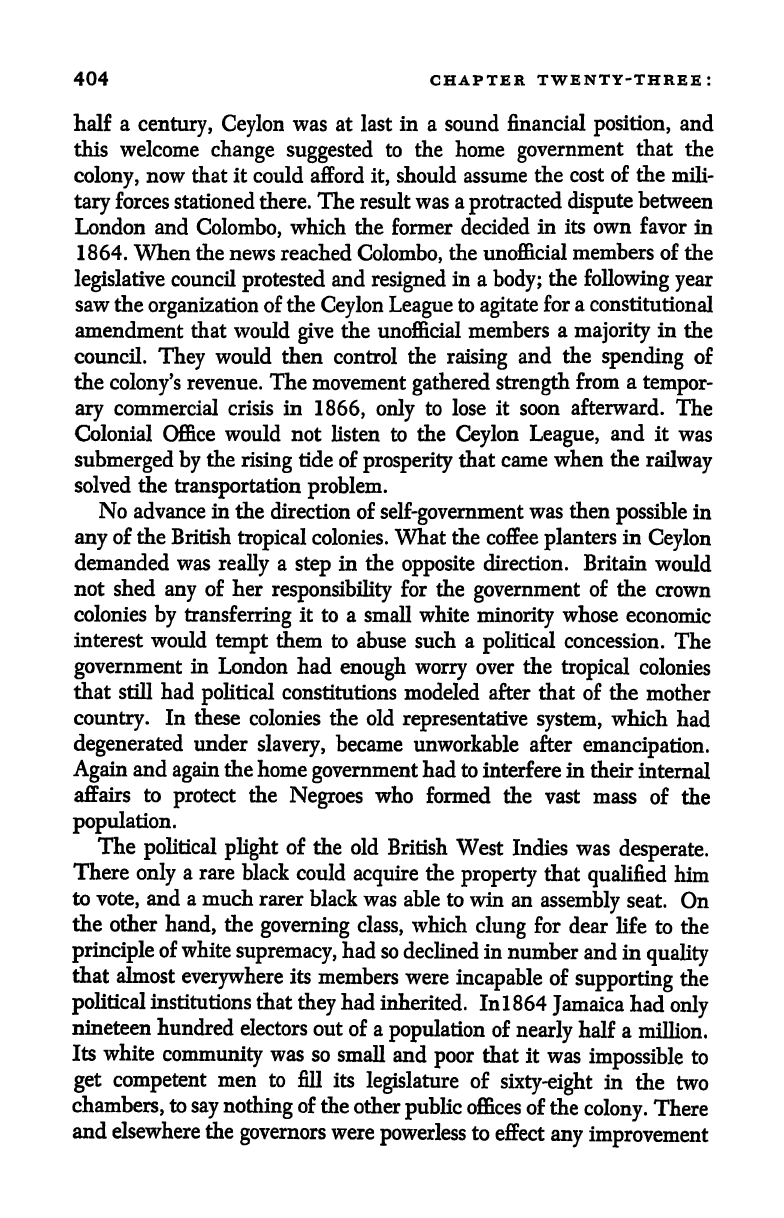
404 CHAPTER TWENTY-THREE:
half a
century,
Ceylon
was at last
in
a sound
financial
position,
and
this welcome
change
suggested
to
the home
government
that
the
colony,
now
that it
could
afford
it,
should assume
the
cost
of the
mili-
tary
forces
stationed there.
The
result was
a
protracted
dispute
between
London
and
Colombo,
which the
former decided
in
its own
favor
in
1864.
When
the
news reached
Colombo,
the unofficial
members of
the
legislative
council
protested
and
resigned
in a
body;
the
following year
saw
the
organization
of
the
Ceylon League
to
agitate
for
a
constitutional
amendment
that would
give
die unofficial members
a
majority
in
the
council.
They
would then
control
the
raising
and
the
spending
of
the
colony's
revenue. The
movement
gathered
strength
from
a
tempor-
ary
commercial
crisis in
1866,
only
to lose
it soon afterward.
The
Colonial Office would not listen to
the
Ceylon League,
and it
was
submerged
by
the
rising
tide
of
prosperity
that
came
when
the
railway
solved
the
transportation
problem.
No
advance
in
the direction
of
self-government
was
then
possible
in
any
of the
British
tropical
colonies. What
the coffee
planters
in
Ceylon
demanded was
really
a
step
in the
opposite
direction. Britain
would
not shed
any
of her
responsibility
for the
government
of the
crown
colonies
by
transferring
it
to a
small
white
minority
whose
economic
interest
would
tempt
them
to abuse such
a
political
concession.
The
government
in
London
had
enough
worry
over
the
tropical
colonies
that
still
had
political
constitutions modeled after
that
of the
mother
country.
In
these
colonies the
old
representative system,
which
had
degenerated
under
slavery,
became
unworkable
after
emancipation.
Again
and
again
the
home
government
had to
interfere in their
internal
affairs
to
protect
the
Negroes
who
formed the
vast mass
of the
population.
The
political
plight
of
the old
British
West Indies
was
desperate.
There
only
a rare
black
could
acquire
the
property
that
qualified
him
to
vote,
and
a
much rarer
black
was able
to win an
assembly
seat.
On
the
other
hand,
the
governing
class,
which
clung
for dear
life
to the
principle
of white
supremacy,
had
so
declined in
number
and in
quality
that almost
everywhere
its
members
were
incapable
of
supporting
the
political
institutions
that
they
had
inherited. In
1864
Jamaica
had
only
nineteen
hundred electors
out
of a
population
of
nearly
half a
million.
Its white
community
was
so
small
and
poor
that
it
was
impossible
to
get
competent
men to
fill its
legislature
of
sixty-eight
in
the
two
chambers,
to
say
nothing
of
the other
public
offices
of
the
colony.
There
and elsewhere the
governors
were
powerless
to
effect
any
improvement
